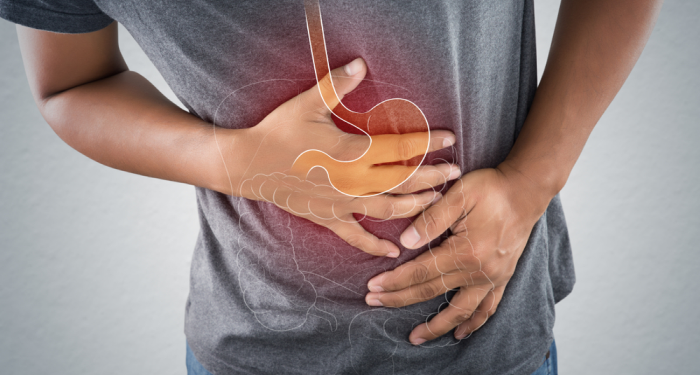Written By: Dr. Emad Fayyad
A gastroenterology specialist, Dr. Emad Fayyad completed his Bachelors and Masters from Romania, and has also qualified for the Jordan Board Certificate in Gastroenterology.
Updated On:December 22, 2023
Read more.

What Are Peptic Ulcers?
Peptic ulcers are inflammations that form on the inner tissue lining of any organ that is part of your digestive system. There are three types of peptic ulcers that are commonly seen:
- Stomach ulcers, also known as gastric ulcers, are open sores that develop on the tissue lining of the stomach.
- Ulcers formed in the upper part of the small intestine, known as the duodenum, are referred to as duodenal ulcers.
- Esophageal ulcers are ulcers that develop in the lower part of the esophagus.
Peptic ulcers are not a rare health problem. In fact, around 10% of adults worldwide suffer from peptic ulcer disease at least once in their life.
Peptic Ulcer Symptoms
People with peptic ulcer disease commonly exhibit the following symptoms:
- Nausea
- Abdominal pain
- Bloated or belched stomach
- Heartburn
- Bloody stool
- Chest pain
- Vomiting, sometimes with blood
- Sudden weight loss
- Appetite changes
- Difficulty breathing
- Feeling faint
When to See a Doctor for Peptic Ulcers
You should contact your general physician as soon as you start experiencing the symptoms listed above with severity or when over-the-counter medications, such as antacids for ulcers, fail to alleviate the pain or do so, but the pain returns.
Causes of Peptic
Peptic ulcers occur when acid in the digestive juices chips away at the inner tissue lining of the stomach, esophagus, or the duodenum & creates painful open sores. This happens when either the concentration of acid is increased or the mucus lining that protects against digestive acids is broken down & unable to stop digestive acids from coming in contact with the inner surface.
There are two main factors that directly lead to the breakdown of the protective mucus lining:
-
Helicobacter pylori (H. pylori) bacteria: Around half of all people in the world have H. pylori bacteria living on the mucus lining of their small intestine & stomach. Normally, the bacteria do not cause any trouble, but in some cases, an H. pylori infection may occur & cause peptic ulcers. An H. pylori infection can cause the stomach to raise the concentration of acids & erodes the mucus layer, the combination of which results in the inflammation of the tissue.
While the exact cause of H. pylori infection itself is unclear & medical researchers have been unable to pin down how the infection spreads, there is data that suggests that H. pylori may spread from person to person through close physical contact, such as kissing. H. pylori bacteria may also spread through dirty water & food, increasing the chances of infection & consequently, peptic ulcers.
-
Pain Medications: Frequent use of pain relievers, medically termed as non-steroidal anti-inflammatory drugs (NSAIDS), such as ibuprofen & aspirin, can cause peptic ulcers, especially gastric ulcers. They inhibit the stomach’s ability to replenish the protective layer of mucus, increasing the chances of stomach acid creating open sores in the inner surface. They also reduce blood flow to the stomach, reducing its ability to heal itself.
Risk Factors for Peptic Ulcer Disease
The risk of getting peptic ulcers is heightened if a person:
- Is a heavy smoker. Smoking increases the chances of H. pylori infection in those that already have the bacteria present in their digestive system.
- Is a heavy drinker. High alcohol consumption irritates the walls of the stomach, breaks down the mucus lining, & increases the production of stomach acid.
- Is constantly stressed out. While mental stress has not been proven to cause the development of peptic ulcers directly, symptoms of peptic ulcers are more aggravated in those who suffer from mental stress.
- Makes chronic use of corticosteroids. This increases the risk of getting peptic ulcers since corticosteroids weaken the immune system.
- Eats spicy foods regularly. Spicy foods increase the buildup of acids in the digestive tract.
Complications Arising from Peptic
Peptic Ulcer needs to be treated at the first instance. Without getting the required treatment, people with peptic ulcer disease can suffer from the following complications:
-
Internal Bleeding: Open sores from peptic ulcers often bleed. This leads to gradual loss of blood that can cause anemia &, if left unchecked, may even require a blood transfusion. It is due to this bleeding that peptic ulcer symptoms such as blood in vomit, bloody stool, & feeling faint take place.
-
Stomach Perforation: Untreated peptic ulcers can perforate or create a hole in the stomach wall, esophagus, or small intestine. A perforated stomach wall increases the risk of abdominal infections.
-
Blockage: If left unchecked, peptic ulcers can obstruct the food passage in the digestive tract. This may lead to a loss of appetite &, in severe cases, result in vomiting & loss of weight, all of which are symptoms of peptic ulcers.
-
Gastric Cancer: Research indicates that peptic ulcer caused by H. pylori infection increases the chances of gastric cancer.
Peptic Ulcer Treatment
Peptic ulcer treatments are geared towards reducing the level of acids in digestive juices & building up the mucus layer that forms a barrier between stomach acids & the inner tissue lining. The type of treatment, however, differs from case to case & will depend on the underlying cause of the peptic ulcer.
-
Treatment for peptic ulcer disease caused by H. Pylori infection: Peptic ulcers resulting from H. pylori bacteria are treated using proton pump inhibitors & antibiotics that are aimed at getting rid of all the H. pylori bacteria in the digestive tract.
-
NSAID-caused peptic ulcer treatment: For peptic ulcers caused by excessive use of anti-inflammatory drugs, the first course of action is to stop the patient from taking those medications & prescribing better alternatives. If the patient needs to take NSAIDs, the doctor may prescribe a counter-medicine to take alongside it.
-
Antacids Treatment: Peptic ulcer medications such as antacids for ulcer disease may be prescribed to treat mild cases.
-
Surgical Treatment: In severe cases where peptic ulcers have caused perforation or massive internal bleeding, doctors may suggest surgery to repair the hole, stop the bleeding, lower stomach acids, & pinpoint the actual cause of the ulcers.
If peptic ulcer symptoms persist even after the treatment, see your doctor immediately.
How to Prevent Peptic
Prevention is always better than cure & peptic ulcers can be prevented by making the following lifestyle changes:
- Reducing alcohol consumption
- Reducing use of NSAIDs such as aspirin & ibuprofen. Paracetamols are a better alternative to use
- Quitting or limiting smoking
- Eating less spicy foods & incorporating more fruits & vegetables in the existing diet
- Manage stress
- Prevent H. pylori infection by ensuring cleanliness of drinking water & food & by washing your h&s before a meal. Also, make sure your food, especially meat, is cooked properly, all the way through.
To underst& more about the symptoms, causes, treatment & prevention of peptic ulcers, get in touch with Medcare.
Meet our doctors from the Gastroenterology department
|
||||||||
|
||||||||
|
||||||||
|
||||||||
|
||||||||
|
||||||||
|
||||||||
|
||||||||
|
||||||||
|
||||||||
|
||||||||
|
||||||||
|
||||||||
|
||||||||
|
||||||||
|
||||||||
|
||||||||
|
||||||||
|
||||||||
|
||||||||
|
||||||||
|
||||||||
Similar Posts
teleMEDCARE App
Download teleMEDCARE app from Google Play or App Store to connect immediately to Medcare doctors at a click of a button and without an appointment.

Home Services
We offer our patients a broad range of home health care services in the comfort of their own homes. Book an appointment for lab tests, vaccinations, nurses and physiotherapists.

Chronic Care
Know more about our Chronic Care Management Programme in partnership with Damana Saicohealth.

teleMEDCARE App mobile
Download teleMEDCARE app from Google Play or App Store to connect immediately to Medcare doctors at a click of a button and without an appointment.

Home Services
We offer our patients a broad range of home health care services in the comfort of their own homes. Book an appointment for lab tests, vaccinations, nurses and physiotherapists.

Spotii
We have partnered with Spotii to offer a more flexible way to pay - Pay over time for your purchase. No interest, no cost & no catch.



























